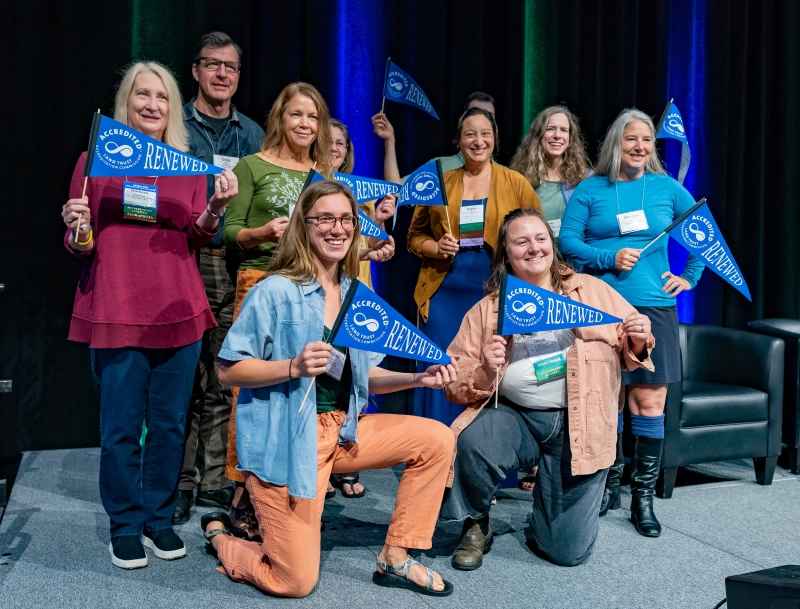 Catch-up on the latest Accreditation Corner from the Land Trust Alliance's Saving Land magazine.
Catch-up on the latest Accreditation Corner from the Land Trust Alliance's Saving Land magazine.
Rally Answers the Question: Why Accreditation?
By Melissa Kalvestrand
"Well, why should my land trust be accredited?" I was asked this question at my very first Rally back in 2009, in Portland, Oregon. That Rally was a whirlwind of inspiration, new people and questions I was just learning how to answer, especially because it was in my early days as a Commission review specialist. Being at Rally 2023, back in Portland again, caused me to reflect on that question and the past 14 years. When asked that question today, my answer is:
"Accreditation matters. Having Land Trust Standards and Practices and an accreditation program has strengthened the whole land trust community and each land trust going through the process. Displaying the seal shows to the world you meet the national standards for excellence, uphold the public trust and ensure that conservation efforts are permanent. Yes, it is a rigorous process. Yes, it takes time and is an investment. But it is an investment in your land trust. It is an investment in the land trust community."
Rally continues to be an inspiration and a whirlwind! I loved talking with so many of you this year in Portland and hearing about what it means for your land trust to be accredited. You inspire me with your stories and conservation work.
Celebrating First-Time Accreditations
At Rally, we celebrated the nine land trusts that achieved first-time accreditation since August 2022, showing us that conservation relies on innovation, patience and persistence, and it is always about people.
- In the Pacific Northwest, Forterra uses landbased solutions to address the climate crisis and support equitable, green and prosperous communities. In 2022, Forterra planted nearly 3,500 native evergreen trees to offset carbon emissions with local forest restoration.
- Downeast Salmon Federation in Maine received $1.8 million to explore nature-based solutions to coastal resilience, including salt marsh rehabilitation at three major sites.
- GreenTrust Alliance restores wetlands, streams and floodplains in the mid-Atlantic region. Its work ultimately improves wildlife habitat, water quality and ecosystem services.
- Pound Ridge Land Conservancy in New York converted a monoculture of Japanese barberry into a native meadow with over 40 different species as part of its efforts to increase the ecological resilience of its landscapes.
- In 2023, the Buck Hill Conservation Foundation in Pennsylvania completed its 20-year effort to acquire Chestnut Mountain. A place once heavily logged now has 5 miles of trails.
- After nearly three decades, Harford Land Trust in Maryland protected the 347-acre Belle Vue Farm, which is adjacent to public lands, contains 1 mile of undisturbed Chesapeake Bay shoreline and is listed as a site on the Underground Railroad Network to Freedom.
- The all-volunteer Platte Land Trust in Missouri celebrated its 25th anniversary. It was formed when Platte County had one park and was experiencing rapid suburban sprawl. Today, this regional land trust can act quickly to meet conservation needs.
- Berkshire Natural Resources Council in Massachusetts connects landscapes and connects people to the land. People use its trails app to plan outdoor adventures, including a hike on The High Road, which is a vision of interconnected hiking trails that connect towns to towns and towns to trails.
- Falmouth Land Trust in Maine recently revived its educational programming with first graders going on recess walks and middle schoolers removing invasive species as part of their Civic Engagement class.
My sincerest congratulations to these nine land trusts. We look forward to seeing how you benefit from being accredited. And we can't wait to celebrate the accredited land trust community at Rally 2024 in Providence.
____________
To see the full archive of Accreditation Corners, please visit our Accreditation Corners page.
